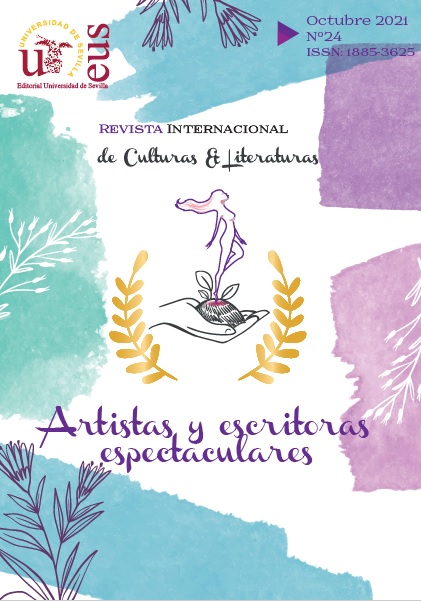IRIS BARRY, ESCRITORA TRANSFRONTERIZA
DOI:
https://doi.org/10.12795/RICL2021.i24.08Palabras clave:
vanguardia, cine, Iris Barry, Daily Mail Atlantic EditionResumen
Iris Barry, olvidada y relegada hoy a los bordes del canon, fue una escritora transfronteriza en varios sentidos. Profesionalmente, se convirtió en la primera crítica de cine en Inglaterra y cruzó el océano para fundar la filmoteca del MoMA y crear el primer programa de estudios de cine, llevando a este del cineclub al museo y a la universidad y elevándolo a la categoría de arte. Textualmente, demostró una gran habilidad para cambiar de registro según la publicación y el público al que se dirigía, desde las revistas literarias del modernismo británico hasta el periódico que batió todos los récords de publicaciones a principios del siglo XX, el Daily Mail, así como la edición trasatlántica del mismo.
Abstract
Forgotten and relegated outside the literary canon today, Iris Barry was a cross-border writer in many ways. She became the first film critic in England and crossed the ocean to found the MoMA’s film library and to create the first academic program for film studies. She brought cinema from film clubs to museums and universities, raising it to the category of art. As a writer, she showed a great ability to shift her style and register based on the publication and the target readers she was addressing, from the little reviews of British Modernism to the newspaper that broke all records in the early 20th century, the Daily Mail, as well as in the Daily Mail Atlantic Edition.
Descargas
Citas
Barry, Iris. Let’s go to the pictures (1926). London: Payson and Clarke. Publicado en Estados Unidos como Let’s go to the movies. Nueva York: Arno Press/New York Times.
Barry, Iris. (5 de septiembre de 1925). “The study of film”. The Spectator, pp. 362-63.
Barry, Iris. (1995). “An Outline of a Project for Founding the Film Library of the Museum of Modern Art”. Film History. Vol. 7, No. 3: 325-335.
Bingham, Adrian. (2013). “’The Woman’s Realm’: The Daily Mail and Female Readers.” Daily Mail Historical Archive 1896-2004: Cengage Learning.
Cayley, Seth. The Daily Mail Atlantic Edition (sin fechar)
Clarke, Tom (1931). My Northcliffe Diary. Londres: V. Gollancz Ltd.
Cooke, Alistair (1970). To Iris Barry (1895-1969). New York Times.
Hankins, Leslie K. (2004). “Iris Barry, Writer and Cineaste, Forming Film Culture in London 1924-1926: the Adelphi, the Spectator, the Film Society, and the British Vogue”. Modernism/modernity 11.3, 488-515.
Manning, Paul A. (2010). News and News Sources: A Critical Introduction. Londres: Sage Publications.
Montagu, Ivor. (1970). “Birmingham Sparrow: In memoriam, Iris Barry”. Sight and Sound, pp. 106-108.
Peel, C S. (1933). Life's Enchanted Cup Life's Enchanted Cup: An Autobiography (1872-1933). Londres: Lane.
Pulitzer, Joseph, and Edmond D. Coblentz. (1968). Newsmen Speak: Journalists on Their Craft. Freeport, N.Y: Books for Libraries Press.
Sitton, Robert. (2014). Lady in the Dark: Iris Barry and the Art of Film. Nueva York: Columbia U.P.
Taylor, Sally J. (1998). The Great Outsiders: Northcliffe, Rothermere and the Daily Mail. Londres: Phönix.
Wasson, Haidee. (2006). “The Woman Film Critic: Newspapers, Cinema and Iris Barry”. Film History: an International Journal. 18(2), 154-162.
Wasson, Haidee. (20202). “Writing the Cinema into Daily Life: Iris Barry and the Emergence of British Film Criticism” en Andrew Higson, ed., Young and Innocent? The Cinema in Britain 1896-1930. Exeter: University of Exeter Press, 321-377.

